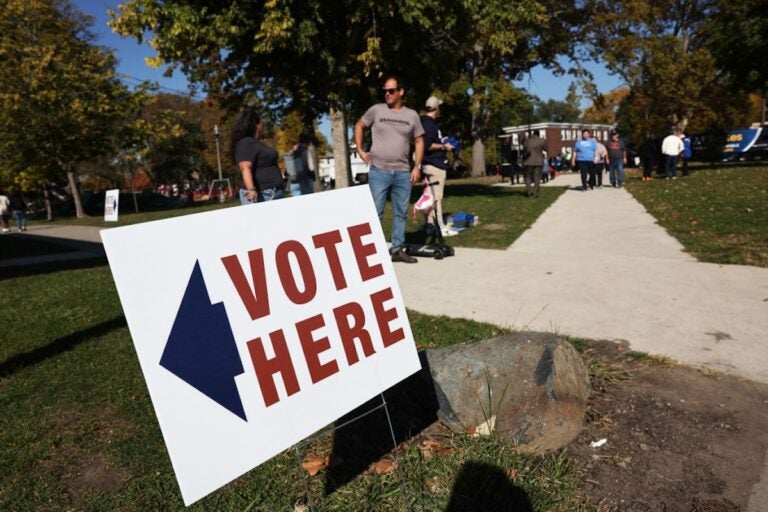These are the 2 paths either Trump or Harris has to follow to become president
With seven states up for grabs, here are the likely scenarios that would put either candidate in the White House.

Residents vote in early voting at a park building in Detroit on Oct. 19. Detroit is the first Michigan community to have early voting. Both Vice President Harris and former President Donald Trump have been campaigning in the key battleground state of Michigan. (Spencer Platt/Getty Images/Getty Images North America)
This story originally appeared on NPR.
Vice President Harris and former President Donald Trump appear locked in a tight race for the presidency, according to polls. The election will likely come down to just a handful of votes in a handful of states, where billions of dollars have been focused over the last year-plus of campaigning.
To become president, a candidate has to win not a majority of the votes, but a majority of electoral votes. The number to reach is 270.
At this point there are essentially seven states in play: Michigan, Pennsylvania and Wisconsin (all part of the ”Blue Wall”), and Nevada, Arizona, Georgia and North Carolina (the toss-up ”Sun Belt” states).
There are lots of different paths to 270 for Harris and Trump, but based on the math, one of these two things have to happen for one of them to win — provided each candidate also wins in the places he or she is favored:
- Trump has to win one of the Blue Wall states, or
- Harris has to win one of Pennsylvania, North Carolina or Georgia.
Put another way: There is no path to the presidency for Trump without winning a Blue Wall state, and there is no path for Harris unless she wins one of the states in that trio.
Trump has a clear path to 270 by chipping a brick out of the Blue Wall, but Harris has more options. Here are the numbers with these potential scenarios that would get each candidate over the top:
1. Harris and the Blue Wall
The most likely path to the White House for Harris is winning Wisconsin, Michigan, Pennsylvania and the one congressional district in Omaha, Neb. (Unlike most other states, Nebraska allocates its electoral votes by a mix of statewide vote and congressional district. The only other state to allocate its electoral votes that way is Maine, and Trump is favored to win one electoral vote there.)
Winning all the places where she’s favored, including Omaha, plus the toss-up Blue Wall states gets Harris exactly to 270 without needing to win any of the toss-up Sun Belt states.
Harris’ campaign — and President Biden’s before her — have been focused on this pathway. Wisconsin, Michigan and Pennsylvania have gone together for Democrats in seven of the last eight presidential elections. The only time they haven’t since 1992 was in 2016 when Trump won.
2. Trump wins Pennsylvania, North Carolina and Georgia
The Trump campaign has poured hundreds of millions of dollars into these three key states. If Trump sweeps them, he gets exactly 270 electoral votes, even without any of the other toss-ups. Trump is currently leading in Arizona — that’s within the margin of error, but by more than in any other state — so it’s less likely that he wins Pennsylvania, North Carolina and Georgia and doesn’t win Arizona, too. That would put him at 281, while losing Nevada, Michigan and Wisconsin.
Georgia was the closest margin by percentage of the vote in 2020, and it was the first time the state had gone Democratic since 1992, when there was a serious third-party candidate who pulled a significant share of the vote.
North Carolina’s demographics have been changing, and the state has become more competitive for Democrats because of it. But Obama won it in 2008 in what was a national blowout by modern presidential political standards. And Harris hasn’t had leads close to what Obama had nationally.
Trump won Pennsylvania in 2016, and his campaign has put more money into the state than anywhere else. It was decided by just over 1 percentage point in 2020, when Biden won it, and less than that in 2016.
3. Harris replaces a brick in the Blue Wall
Let’s say Trump does, in fact, chip off a piece of the Blue Wall. There are still at least two paths to the White House for Harris if she loses any of the three Blue Wall states.
If she loses Wisconsin or Michigan, she could replace their 10 or 15 electoral votes, respectively, with 16 from either North Carolina or Georgia, or with a western sweep of Arizona in place of Wisconsin, or Arizona and Nevada for Michigan. But with Harris trailing in Arizona — albeit within the margin of error — makes that last scenario a little less likely.
Replacing Pennsylvania and its 19 electoral votes is harder. That would take winning Georgia or North Carolina plus one of the western swing states, or both Georgia and North Carolina.
If Harris loses the Blue Wall entirely, she could still win by getting all of the Sun Belt states. That would get her to 275 electoral votes. Harris has been very close in the Sun Belt states because of their emerging populations of Black, Latino and Asian American voters, but she’s been polling slightly worse in the Sun Belt than the Blue Wall, so a Sun Belt sweep seems less likely.
4. Trump builds the Red Wall
Trump won Wisconsin, Michigan and Pennsylvania in 2016, and if he sweeps them again, he could win even if he loses North Carolina, Georgia and Nevada.
He would just have to win Arizona of the Sun Belt swing states in this scenario.
WHYY is your source for fact-based, in-depth journalism and information. As a nonprofit organization, we rely on financial support from readers like you. Please give today.





